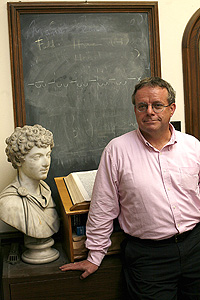Christopher Faraone, Frank Curtis Springer and Gertrude Melcher Springer Professor in the Humanities and the College
By Josh Schonwaldjschonwa@uchicago.edu
News Office
 Christopher Faraone | |
The ancient Greeks living in the Roman Empire usually thought about exorcism in one way: Healers tried to get demons out of the body.
But some of the texts that Christopher Faraone showed graduate students this spring have puzzled scholars: They invited demons into the body.
Faraone, one of the world’s leading authorities on ancient Greek magic, introduced these puzzling “bring in the demon” prayers in his graduate seminar on Ancient Greek Magic with a clear pedagogical intent.
Along with having smaller classes—five to six students is optimal—and customizing the curriculum around students’ interests, Faraone, the Frank Curtis Springer and Gertrude Melcher Springer Professor in the Humanities and the College, regularly tries to introduce his graduate students to texts that “don’t fit.”
Faraone, who has taught at Chicago since 1991, said he seeks to introduce primary texts that simply don’t fit the prevailing paradigms or theories because he wants his students to “think outside of the box” and develop original and better paradigms that fit all of the evidence.”
Whether spurring research in his seminars or as a dissertation advisor, Faraone said the ultimate goal in working with graduate students is to produce original scholarship. “And when that happens,” he said, “it’s enormously satisfying. It’s a really interesting process to watch—you see a light bulb go off, and then quickly a seminar paper turns into a published paper.”
A leading scholar of archaic and Hellenistic Greek poetry and Near Eastern influences on early Greek culture, as well as one of the world’s leading authorities on ancient Greek magic, Faraone believes working with graduate students doesn’t stop with the end of the seminar, publication or the granting of a Ph.D. It doesn’t even stop at the point of getting a first job, he said. “I don’t really stop worrying about my students until they have tenure,” he said.
A prolific scholar, Faraone admits, “in an ideal, selfish world, I would never teach the same thing twice.” But, the reality is, he said, “you develop a reputation. And people come to Chicago because they’re interested in learning about ancient Greek magic or religion.”
As a way of invigorating seminars and avoiding repetition in courses such as the one he teaches on Greek magic, Faraone will introduce new texts, new issues and recent changes in theoretical approach. And because he often tailors his seminars to the specific interests of the students, the freshness of the class simply comes from his students.
In this year’s seminar on Greek magic, for instance, one student was interested in the Jewish influence on Greek magic. Two others, who are students in the Program on Ancient Mediterranean World and studying the ancient Egyptian languages of Coptic and Demotic, were specifically interested in the Egyptian influence on Greek spells. “It’s exciting, said Faraone, “when the interests of the students really push me into new directions.”
In addition to the seminars, Faraone regularly teaches a class in Greek poetry, which is part of the survey courses required of Classics graduate students.
Greek poetry is part of a grueling four-course sequence that includes prose, composition and the history of Greek literary theory. Faraone said of the course, “It’s not unlike coaching soccer. You want to find a balance between pushing the students and maintaining high standards, and being encouraging.”
Faraone describes his approach to teaching Greek poetry as a “little old-fashioned;” he likes to focus on the mechanics of the poem.
What may be unusual is each class begins with reading aloud for at least five or 10 minutes. “Greek poetry was meant to be performed at theaters, dinner parties and symposia. I want them to experience this.”
![[Chronicle]](/images/sidebar_header_oct06.gif)